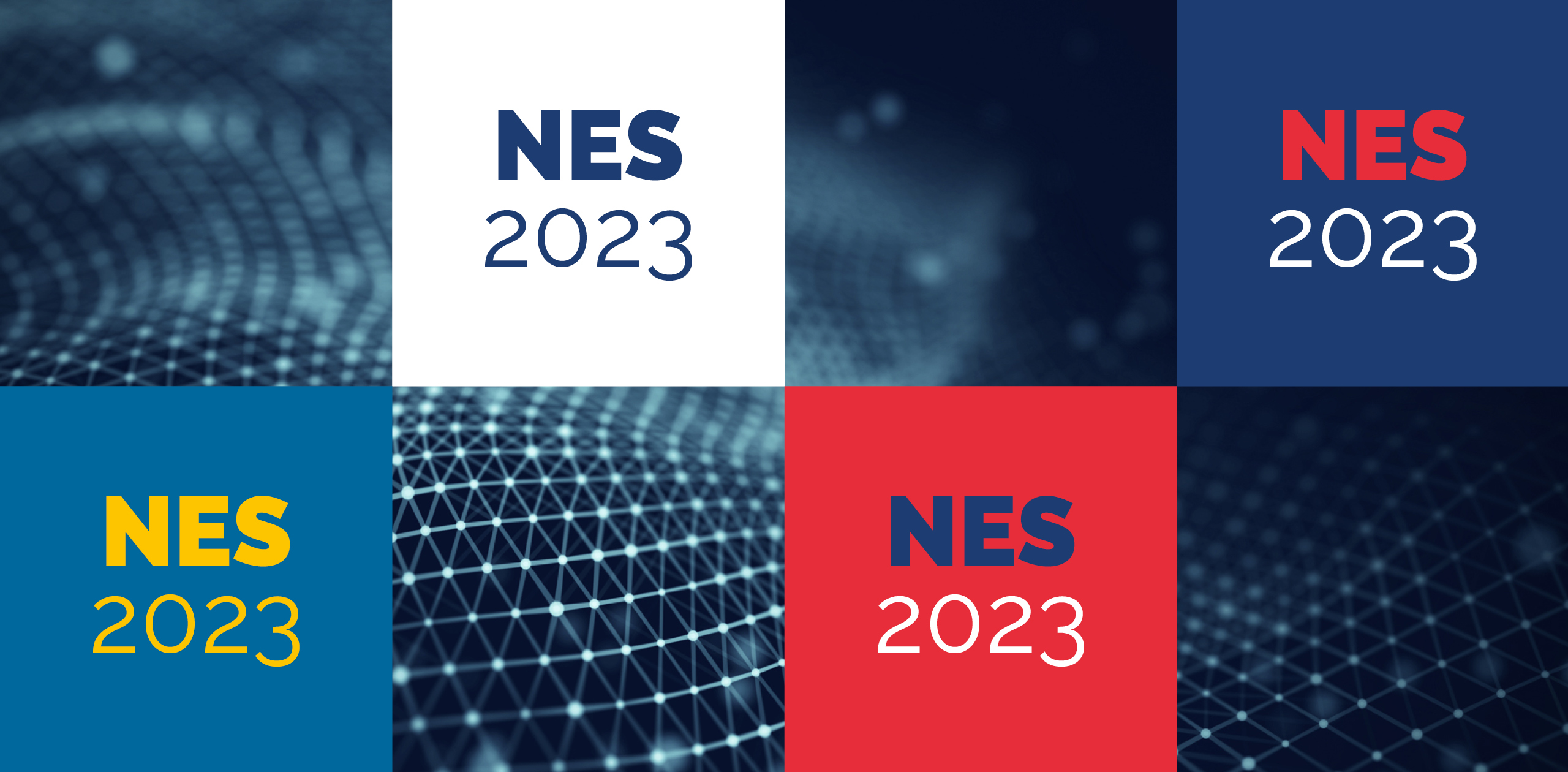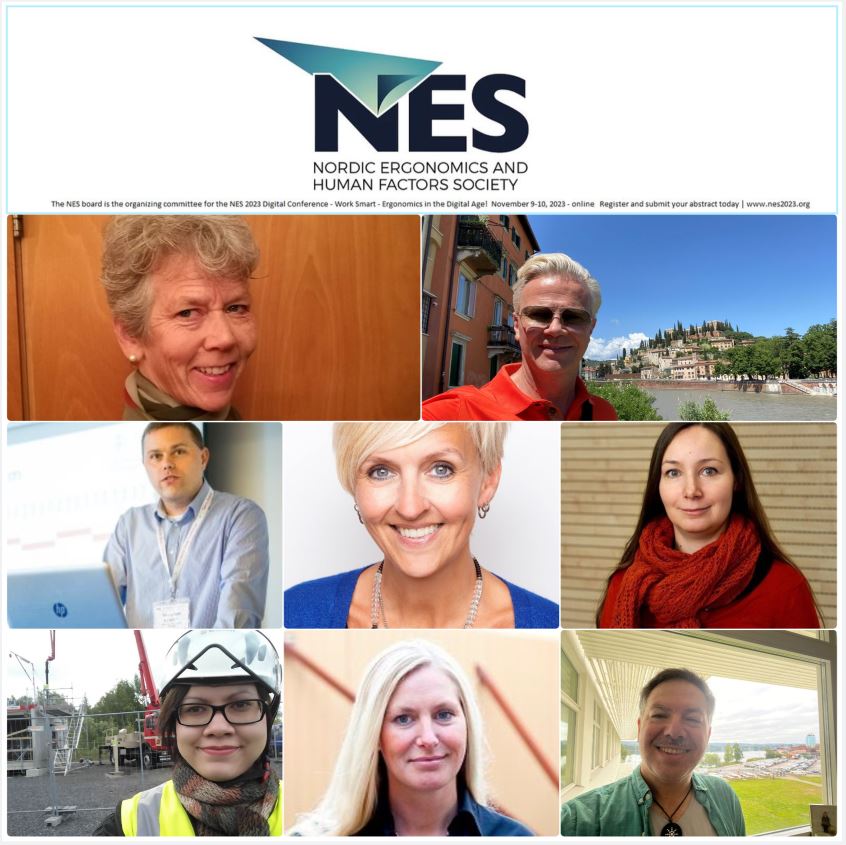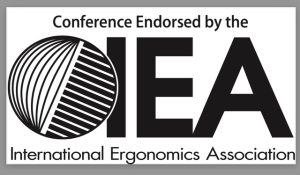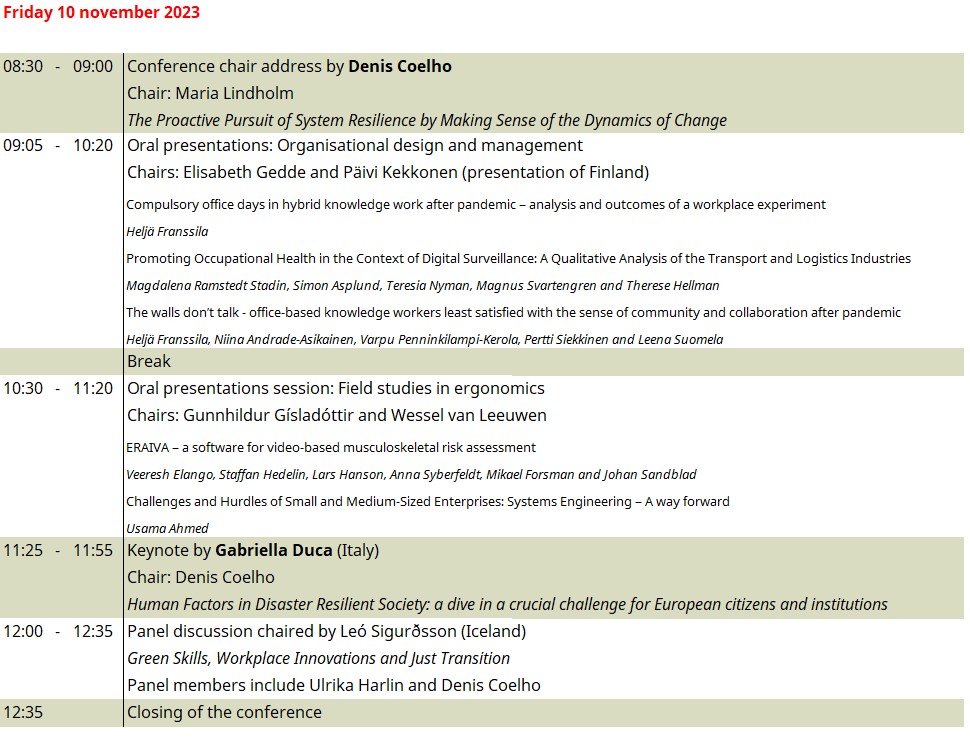
Work smart – Ergonomics in the digital age.
Welcome to the annual conference of the Nordic Ergonomics and Human Factors Society on 9.-10.11.2023. This year’s theme is Work smart – Ergonomics in the digital age.
The deadline for abstract submission has passed now and registration is no longer possible.
Scroll down to have a look at the program or download it as a PDF here.
Sign up for a mailing list to receive news and updates about the conference.
Kind regards,
NES Organising Committee

About
Dear Friends and colleagues,
 It is our great pleasure to invite you to the annual conference of the Nordic Ergonomics and Human Factors Society on 9.-10.11.2023 (NES 2023). This year’s theme is Work smart – Ergonomics in the digital age.
It is our great pleasure to invite you to the annual conference of the Nordic Ergonomics and Human Factors Society on 9.-10.11.2023 (NES 2023). This year’s theme is Work smart – Ergonomics in the digital age.
The topic for NES 2023 invites to investigate and discuss how to work smart in ergonomics and human factors prospective in the digital age. How can human factors and ergonomics answer to the challenges related to digitalization, job transformation, and organizational changes? How can human factors and ergonomics contribute to promoting a human-centered development of future work?
The conference topic reflects this challenging situation in highlighting the need for using and developing good ergonomics and human factors that aims at incorporating the whole work environment into consideration, while at the same time ensuring profitability and stimulating innovation. Adhering to the EU-OSHA’s Safe and healthy work in the digital age -campaign, NES 2023 hopes presentations especially related to, but not limited to, human factors and ergonomics in digital platform work, advanced robotics and artificial intelligence, remote work, smart digital systems, and worker management through artificial intelligence.
Advanced robotics and artificial intelligence (AI)-based systems have both opportunities and challenges. They affect to designing and performing work, removes dangerous tasks from employees, and bring issues regarding human-machine interaction. AI-based management systems can be used to support automated or semi-automated decision making, but they also bring new psychosocial risk factors in monitoring and managing employees. Related to this, smart digital systems are used as monitoring systems (smartphone apps, wearables, etc.) to monitor OSH which brings questions about data privacy, ownership issues and standardization. As new or emerging way of work, both digital platform work and remote work are increasing. These types of work include a wide variety of tasks leading to various opportunities, challenges and risks.
NES 2023 will be an online meeting place for researchers and practitioners with an interest in the field of ergonomics and human factors. It facilitates sharing of experiences and results that help the development of research, work and ideas, the formation of networks as well as increasing the quality of the fields of ergonomics and human factors. The conference will consist of presentations and discussions through interactive webinars.
On behalf of the organizing committee, you are cordially invited to present your own work, experience, views on any other area that you experience as relevant, at the conference.
On behalf of the Nordic Society of Ergonomics and Human Factors,
Denis A Coelho (Conference Chair)
The NES2023 conference committee is composed of the following people:
Maria Lindholm (NES board)
Päivi Kekkonen (NES board)
Cecilia Österman (NES board)
Leó Sigurðsson (NES board)
Wessel van Leeuwen (NES board)
Elisabeth Gedde (NES board)
Gunnhildur Gísladóttir (NES board)
Denis Coelho (NES board)
Arto Reiman (Oulu University, Finland)
Magga Dóra Ragnarsdóttir (Reykjavik University, Iceland)
Kati Päätalo (Tampere University, Finland)
Gabriella Duca (ISSNOVA, Italy)
Ulrika Harlin (Research Institutes of Sweden and Linköping University, Sweden)
Kristina Säfsten (Jönköping University, Sweden)
the ERY board
the EHSS board
the VINNIS board
Call for papers
Call for papers was open until 31st October and should have been within one of the following topics:
- Activity theories for work analysis and design
- Affective design
- Aging
- Anthropometry
- Auditory ergonomics
- Crisis information design with a HF/E perspective
- Design and implementation of activity-based work environments
- Digital human modelling and simulation
- Ergonomics for children and educational environments
- Ergonomics in design for All
- Ergonomics in manufacturing
- Gender and work
- Health and safety HF/E and sustainable development
- Human factors in robotics
- Musculoskeletal disorders
- Organisational design and management
- User-centred product development and evaluation of equipment
- Visual ergonomics
This year’s conference has two affiliated journals. Authors of conference presentations are invited to submit extended versions of their conference presented research study to one of the Special Issues in the following NES 2023 digital conference affiliated scientific peer-reviewed journals:
International Journal of Human Factors and Ergonomics – Scopus indexed. Special Issue: ”NES 2023 – Work Smart – Ergonomics in the digital age” (extended research papers from the conference – 5000 words minimum length manuscript submissions welcome from conference presenters) – Free publishing in traditional mode, open Access available for a discounted fee for conference presenters.
Registration
Registration is closed now. After registration your eligibility to attend will be checked and you will receive all necessary information and links to attend shortly before the start of the conference.
Please note that in order to be eligible for participation, you have to be either a member of any of the NES societies or of HFES Europe. Do not hesitate to become a member of any of these in order to be able to join NES2023. More information on the different societies can be found on the following pages:
Program
The program will start at lunchtime on 9th November and end at lunchtime on the 10th of November. The programme is as follows (please note that all times are indicated in CET, i.e. the time in for instance Sweden, Norway, Denmark, Germany and The Netherlands). Abstracts can be read here.


The student session on Thursday 9 November from 13:00 to 14:00 will be open access even to non-NES members. Go in here in order to register just for the student session and use your organisational or school/university e-mail when doing so.
Keynote The digital workplace

Magga Dóra Ragnarsdottir is the principal designer and founder of Mennsk ráðgjöf, a civic design agency. She has been working in the digital space since last century and with her joint background in computer science and psychology has placed herself firmly on the intersection between humans and technology. She holds a yearly digital product design course at the University of Reykjavik, Computer Science department.
In her keynote (Thursday 9th November) she will discuss how our digital work environment should also fall under regulations on health and safety.
Keynote Brain health in the digital age – viewpoint of ethics and affections at work
 Kati Päätalo, PhD, works as a principal lecturer (leadership and well-being promotion) at Oulu University of Applied Sciences in Finland focusing her work on Master’s degree programmes, further education and RDI. Her research and development areas relate to leadership focusing on well-being at work, evidence-based health services and measuring well-being at work. Kati Päätalo also leads research, development and innovation line in a well-being and cultural field of expertise (OUAS) with a focus on well-being and competent staff. She has over 20 years of experience in teaching and developing especially occupational health services. Kati Päätalo with her colleagues in OUAS has participated in Sustainable Brain Health project (2020-2023), which focused on cognitive ergonomics, information ergonomics, affective ergonomics, self-direction and ethical workload.
Kati Päätalo, PhD, works as a principal lecturer (leadership and well-being promotion) at Oulu University of Applied Sciences in Finland focusing her work on Master’s degree programmes, further education and RDI. Her research and development areas relate to leadership focusing on well-being at work, evidence-based health services and measuring well-being at work. Kati Päätalo also leads research, development and innovation line in a well-being and cultural field of expertise (OUAS) with a focus on well-being and competent staff. She has over 20 years of experience in teaching and developing especially occupational health services. Kati Päätalo with her colleagues in OUAS has participated in Sustainable Brain Health project (2020-2023), which focused on cognitive ergonomics, information ergonomics, affective ergonomics, self-direction and ethical workload.
In her keynote lecture (Thursday 9th November), Kati Päätalo will focus on brain health in different sectors with a main focus in affective ergonomics and ethical challenges at work. Lecture will include research results and practical procedures and tools to support workplaces and employees to work smart from the viewpoint of brain health.
Keynote Human Factors in Disaster Resilient Society: a dive in a crucial challenge for European citizens and institutions
 Gabriella Duca is a human factors scientist with a background in architectural design. She got her PhD on human–built environment interaction at Genoa University and has held the Eur.Erg. international qualification since 2003. She has 15+ years experience as an academic researcher and is now president of the ISSNOVA Foundation, where she also leads the Human Factors Integration Lab. Her research experience has addressed the transdisciplinary application of human factors with a focus on task analysis and human performance assessment, safety culture, human and organizational factors in systems sustainability, efficiency and resilience, human–built environment interaction, and inclusive and service design. She has conducted national and European research projects for a variety of private companies and public authorities. She is a full member of the HFES: Human Factors and Ergonomics Society Europe Chapter and SIE Società Italiana di Ergonomia e Fattori Umani, where she served as national board member between 2010 and 2018. She is an editorial board member of Frontiers in Sustainable Cities—Urban Resource Management.
Gabriella Duca is a human factors scientist with a background in architectural design. She got her PhD on human–built environment interaction at Genoa University and has held the Eur.Erg. international qualification since 2003. She has 15+ years experience as an academic researcher and is now president of the ISSNOVA Foundation, where she also leads the Human Factors Integration Lab. Her research experience has addressed the transdisciplinary application of human factors with a focus on task analysis and human performance assessment, safety culture, human and organizational factors in systems sustainability, efficiency and resilience, human–built environment interaction, and inclusive and service design. She has conducted national and European research projects for a variety of private companies and public authorities. She is a full member of the HFES: Human Factors and Ergonomics Society Europe Chapter and SIE Società Italiana di Ergonomia e Fattori Umani, where she served as national board member between 2010 and 2018. She is an editorial board member of Frontiers in Sustainable Cities—Urban Resource Management.
European citizens face increasingly severe events due to intrinsic risks of their territories and climate change. It is clear that risks and disasters have practical effect on citizens’ physical, psychological and social wellbeing and public institutions are challenged by strategical and operational issues dealing with prevention, preparedness, response, recovery and building back better, with the aim to mitigate negative impacts at individual and collective levels. In this context of many and interwoven actors, places, rules and mechanisms, everyone plays a role and everyone must be included in plans and operations for citizens safety.
Human Factors, as whole discipline, has developed concepts and tools widely applied in High Reliability Organizations but… what happens if the safety critical context embraces the overall society? Can we, and in what extent, transfer our everyday practices and knowledge to the purpose of public safety when a crisis occurs? How can HF boost civil protection dynamics, fostering the cooperation among citizens, citizens’ organizations, practitioners and all involved public institutions?
In her keynote lecture (Friday 10th November), Gabriella Duca will explore a variety of Human Factors and Ergonomics concepts and tools to integrate human factors and human variability, in plans and procedures for an increasingly disaster resilient society, also providing examples of running projects and achievements in this field.
Panel discussion on Friday 10th November
The panel discussion on Friday will be chaired by Leó Sigurðsson from Vinnís (Iceland) and will deal about Green Skills, Workplace Innovations and Just Transition. A brief teaser on the discussion can be watched below: